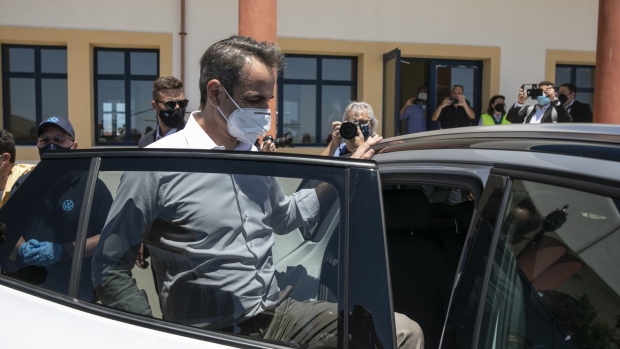Jun 2, 2021
Greek Island Plans Green-Energy Shift to Power Electric VW Fleet
, Bloomberg News

(Bloomberg) -- Greece will set up renewable-energy infrastructure, including solar panels and batteries, on one of its small islands that will convert its entire vehicle fleet to electric models from Volkswagen AG.
The government plans to install a 3 megawatt-hour solar park and 7 Mwh battery system on Astypalea by 2023 that will cover just over half of the island’s overall energy demand and be enough for all electric-vehicle charging needs. A second phase of the project could include adding wind turbines to handle more than 80% of power demand by 2026.
Greek Prime Minister Kyriakos Mitsotakis will detail the plans at an event Wednesday on the island where VW will donate the first EV for use by the local police, coastguard and local municipality. The Hellenic Electricity Distribution Network Operator, or Hedno, also will unveil its first 12 recharging stations.
The 10 million euros ($12 million) budgeted for the project is tiny relative to the tens of billions of euros that Europe’s largest automaker is plowing into developing the auto industry’s broadest fleet of EVs. But Astypalea will serve as a test case both for VW and Greece, which is looking to transition energy systems on non-interconnected islands to greener power.
Read more: VW Will Transform a Greek Island Into a Green Mobility Hub
Of the roughly 1,500 vehicles now on the island, about a third are cars, and most of them are very old, Maik Stephan, VW’s head of business development who runs the Astypalea project, told reporters. The plan is to replace all of them with models such as the VW ID.3 hatchback, ID.4 SUV and ABT e-Transporter vans, as well as the Seat MÓ eScooter.
By switching to a hybrid energy system and replacing aging fossil fuel-based generators, the government aims to cut energy costs by at least 25%, plus reduce carbon-dioxide emissions from the island’s energy system by 50% in the first phase and 70% in the second phase.
©2021 Bloomberg L.P.

